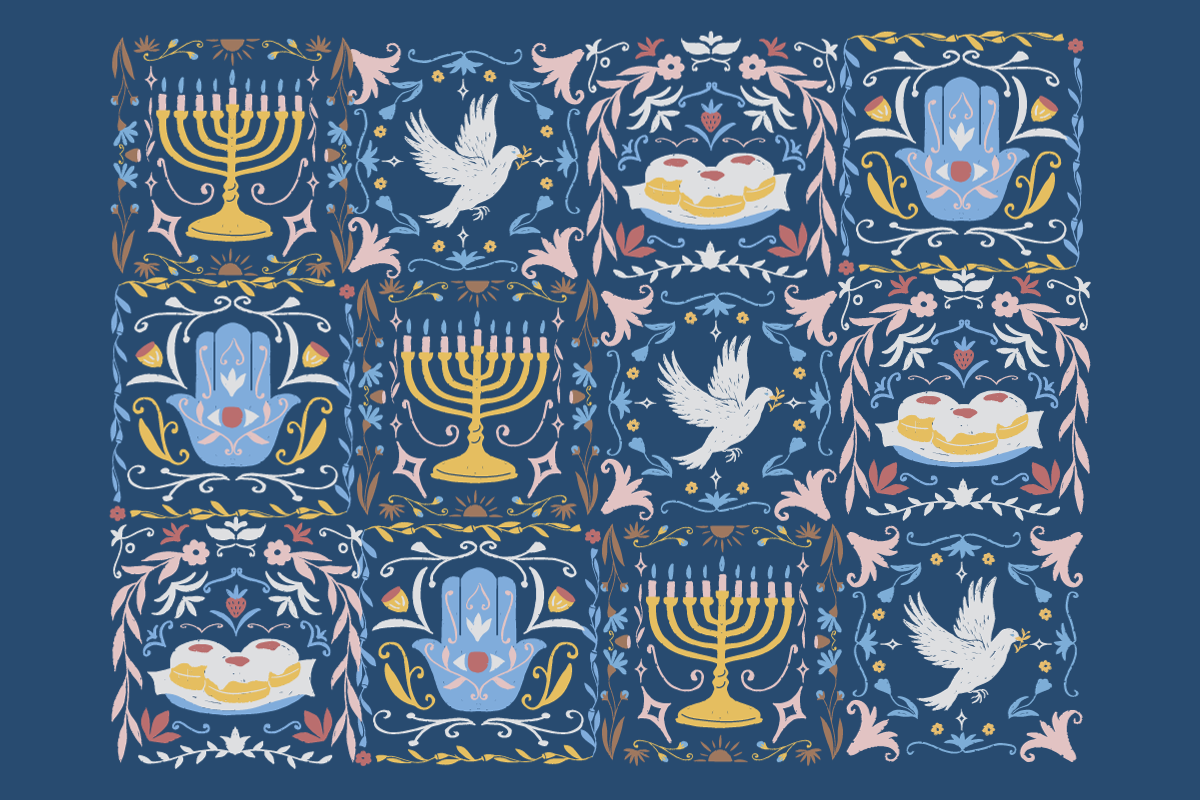Hanukkah, oh Hanukkah: It’s almost that time of year again.
And this year, I have mixed feelings about the Festival of Lights.
Don’t get me wrong, holidays can be wonderful, especially ones that include lighting up dark, cold winter evenings with twinkling candles, gifts and lots of fried food. But it’s no secret that holidays can also come with a lot of baggage. This year, no doubt, many of us will have the situation in Israel and Gaza — especially the hostages and innocent civilians — sitting heavily in our minds, along with the fresh wave of anti-Jewish hatred at home.
This strain is likely to be compacted with more immediate stressors that compound holiday-related angst, like the pressure that falls on parents — mothers in particular — to create magical holiday memories for our kids. As I’ve written before, as a convert to Judaism who is the lone Jewish adult in my family, I’m a one-woman show when it comes to making sure my Jewish daughter, who is 4, experiences Hanukkah in addition to the lavish Christmases her extended family celebrates. This, plus my own lingering sense of Jewish imposter syndrome that tends to surface around the holidays?
It’s just a lot.
In thinking about how I can help my daughter celebrate Hanukkah in a way that won’t stretch my sanity even thinner, one thing I’ve realized about previous Hanukkahs is that I tend to buy a lot of Hanukkah stuff. Menorahs, pajamas, mugs, decorations, lights, clothes, big gifts: You name it, I have it. (Except for the “Hanukkah Santa” – iykyk. Yikes.)
And don’t get me wrong — I don’t think there is anything inherently wrong with this. In fact, I’d go so far as to say I’m glad that retailers are realizing that not everyone celebrates Christmas. There are a lot of other December holidays, and it makes me glad to see Judaism represented in stores.
The rub, though, is that this can be a double-edged sword. It’s not, I’d hazard to say, that most corporations care about making sure Jewish customers feel seen, but about their bottom line. Jews may not make up a big percent of the population, but we are nevertheless a specific consumer group to whom they can hawk their wares.
For me, I’ve recognized the ways in which I’ve fallen hook, line and sinker for this capitalist trap. When, as a convert, I feel uncertain about my status as a Jew around holidays? BUY MORE STUFF! Anxious my daughter will remember Christmases with her grandparents more than my Hanukkah celebrations? BUY MORE STUFF! Buying anything and everything I can find that is emblazoned with a menorah or dreidel has become a Band-Aid for bigger underlying issues.
Recognition, I suppose, is the first step. The next, then, is changing my behaviors.
So, this year, I’m going to try something new for Hanukkah. Instead of focusing on the superficial stuff, I’m going to do my best to model a Hanukkah observance that centers meaning over material.
Yes, there will be decorations to put up and gifts to buy my daughter, but I’m going to keep them small and focused on togetherness instead of trying to out-gift Santa Claus.
For instance, my daughter loves going to the library — something I typically avoid like the plague since, well, it’s always jam-packed with kids who sound like they have the actual plague. But, for her, I’m going to dig out the masks and take her on a Hanukkah-themed book hunt. It’s a win-win: She gets to do something she loves and we’ll also get special time together at home reading the books throughout the week.
She’s also learning to write and very into crafts at the moment, so I’m going to take advantage of that and come up with some inexpensive, easy Hanukkah crafts (like menorah painting and card-making) that lean into her interests and allow her to create something that will connect her to the holiday. And — I think the kicker here — is that I will do the crafts with her, rather than using them as an activity to keep her busy so I can get something else done.
Despite what capitalist corporations want me to believe, buying more Hanukkah-branded products will not make me more Jewish. It’s not going to bring the hostages home, or make the bombing stop. It’s not going stop Americans’ eagerness to hate Jews. In fact, I think there is an argument to be made that in commercializing Hanukkah into a holiday centered on stuff and gifts — like what Christmas has largely become — actively harms its potential for deeper meaning.
When it comes down to it, I want my daughter’s memories of childhood Hanukkahs to be anchored in memories of family togetherness, not the gifts she unwrapped. To get there, though, I realize that I need to shift my own attitude away from material aspects of Hanukkah to how we spend our time during those eight nights.
I’m proud to be Jewish. And, to be clear, I’m also glad that Jews have more options when it comes to visible displays of our Jewishness. But there is a balance that needs to be struck between visibility and commercialism. Working to find that balance, I think, can help all of us create holiday memories that are meaningful, not just material.








